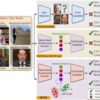NASA and Boeing are now targeting July 30 for an uncrewed test flight of the aerospace company’s troubled Starliner capsule to the International Space Station, they announced Thursday.
The launch has been postponed multiple times, with the last announced date of April scuppered due to a cold snap that caused extensive power outages in Texas in March.
The NASA Commercial Crew program is run partly from the Johnson Space Center in Houston, though it launches from Cape Canaveral in Florida.
Lift-off is now scheduled for 2:53 pm Eastern Time (1853 GMT) on July 30.
“NASA and Boeing have done an incredible amount of work to get to this point,” said Steve Stich, Commercial Crew program manager.
Starliner’s first crewed flight is expected to follow after that, no earlier than September.
During an initial uncrewed test flight in December 2019, the Starliner capsule failed to dock at the ISS and returned to Earth prematurely.
NASA later identified 80 corrective actions Boeing needed to take and characterized the test as a “high visibility close call” during which time the spacecraft could have been lost twice.
Boeing has fallen far behind Elon Musk’s SpaceX, the other company chosen by NASA to develop a vessel to transport astronauts to the ISS.
SpaceX’s Crew Dragon capsule has now taken three astronaut crews to the ISS—the last being the Crew-2 mission which included the first European, Thomas Pesquet, last month.
Both companies were awarded billions of dollars by NASA to restore American capacity to launch astronauts following the end of the Space Shuttle program in 2011.
Between 2011 and 2020, when SpaceX carried its first crew, the US was left reliant on Russian Soyuz rockets for rides to the orbital outpost.
Boeing Starliner test flight postponed
2021 AFP
Citation:
Boeing’s troubled Starliner capsule now aiming for July launch (2021, May 6)
retrieved 6 May 2021
from https://phys.org/news/2021-05-boeing-starliner-capsule-aiming-july.html
This document is subject to copyright. Apart from any fair dealing for the purpose of private study or research, no
part may be reproduced without the written permission. The content is provided for information purposes only.


